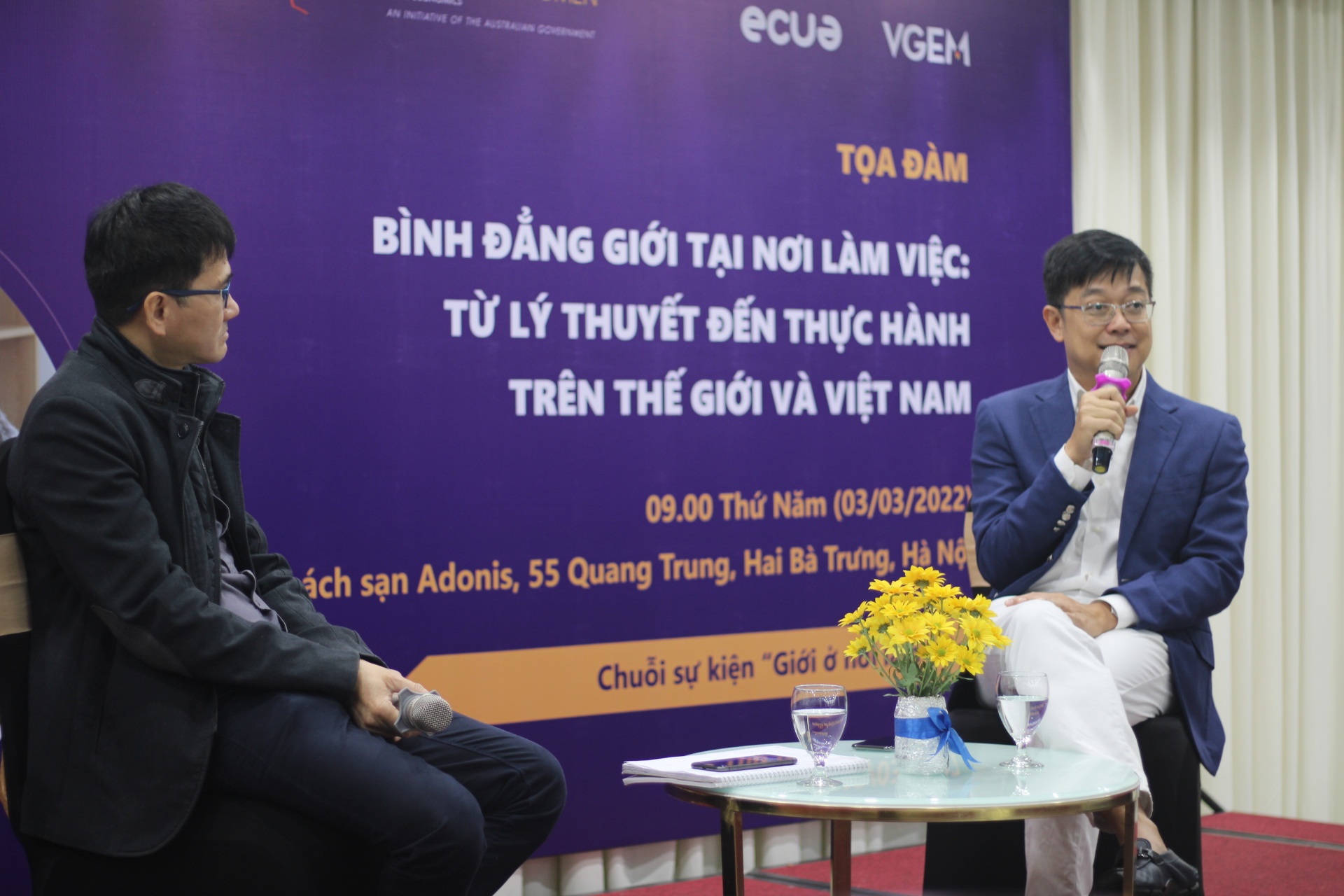Creating an equal working environment
 |
| At the seminar |
Gender inequality in the workplace remains pervasive. Within the same company, office and service jobs still tend to have a higher proportion of women. In contrast, technical and managerial positions are generally occupied by men.
The higher the management level, the lower the proportion of women becomes, even in enterprises with a majority of female employees.
For example, in the textile and garment industry, although women make up about 70 per cent of the workforce, the proportion of women working as managers only stands at about 30 per cent. This division not only limits options for both sexes but also disadvantages women due to the fact that office jobs often pay less than technical and managerial positions.
According to ECUE's gender equality study, which is being carried out with the support of Investing in Women, many businesses in Vietnam are working to promote greater equality.
Some organisations focus on addressing vertical diversity by setting goals to increase the number of women in management, while others focus on solving horizontal inequality, aiming to recruit more women into their technical and sales departments.
“The efforts to promote gender equality by leading enterprises in Vietnam are greatly appreciated,” said Le Quang Binh, director of ECUE Vietnam.
“However, businesses should move beyond quantitative indicators because, while they are easy to measure, achieving them may not address the root causes of gender inequality. The focus must be on the stereotypes and cultural structures that are excluding women from management and technical roles,” he added.
According to Binh, in order to fully address the problem, businesses need to pay more attention to the whole process of change, not just the quantitative results.
Joint learning programmes are required to mitigate existing gender stereotypes in business, and to experiment with change in departments where the managers are willing to promote gender equality. More importantly, though, the process must be open, allowing everyone to express their opinions, and must be led by someone who has suitable knowledge and experience to pass on.
Dr. Pham Quoc Loc, vice chancellor of Pacific Ocean University said, “To make changes, businesses need to focus on the qualitative part, especially changing the organisational structures that are creating inequality for women. Otherwise, the company can achieve good numbers, but in fact, the rules of the game still disadvantage women."
When comparing how Vietnamese and international businesses promote gender equality, Loc argues that international companies emphasise accountability, while in this country they are led by trends. In addition, international organisations have corporate social responsibility activities to promote gender equality and social integration, while this is less common in Vietnam.
Loc said, many studies have shown that the formation of corporations in the US in the 19th century created management philosophies that excluded women from leadership positions. Management theories often emphasised qualities that seemed to be gender-neutral, but actually implied that the field of management suited masculinity.
The speakers all noted that it is very important for businesses to participate in the process of promoting gender equality in society because they will benefit from a more diverse labour market.
ECUE's Binh added, “Gender issues are multidimensional, so there needs to be cooperation between state management agencies, businesses, and social organisations such as ECUE and VGEM. When working together, I hope we will complement each other to create a rich, healthy, and effective ecosystem to promote gender equality, leading to a more just and prosperous Vietnam."
What the stars mean:
★ Poor ★ ★ Promising ★★★ Good ★★★★ Very good ★★★★★ Exceptional
 Tag:
Tag:
Themes: Empowering Women
- Female influence still to be attained
- Shaping Vietnam's corporate future: female board members show business excellence
- Nestlé Vietnam contributes to elevating the role of women across the supply chain
- Empowering female leaders in tech: insights and aspirations shared at KPMG Tech Innovator 2023
- Brighter Path programme hosts empowerment meeting for ethnic minority girls
Related Contents
Latest News
More News
- Vietnam Television launches third 'Song Sau Lu' project for 2025 (December 15, 2025 | 08:00)
- Closing workshop highlights five-year impact of Fair for All project (December 12, 2025 | 16:22)
- Stakeholders mobilised before new child safety rules take effect (December 10, 2025 | 09:00)
- Vietnam receives emergency international relief as regional flooding intensifies (December 04, 2025 | 15:11)
- AmCham scholarships awarded to students (December 02, 2025 | 16:46)
- Vietjet flights carry love to devastated central region (November 28, 2025 | 11:35)
- SCG Sharing the Dream supports Vietnam’s youth and sustainable development goals (November 28, 2025 | 10:55)
- Siemens Caring Hands donates $34,700 for disaster relief in Vietnam (November 26, 2025 | 20:25)
- Ireland extends support for the Resilience First initiative (November 26, 2025 | 15:24)
- South Korea funds IOM relief for Vietnam’s typhoon-affected communities (November 24, 2025 | 15:33)






















 Mobile Version
Mobile Version